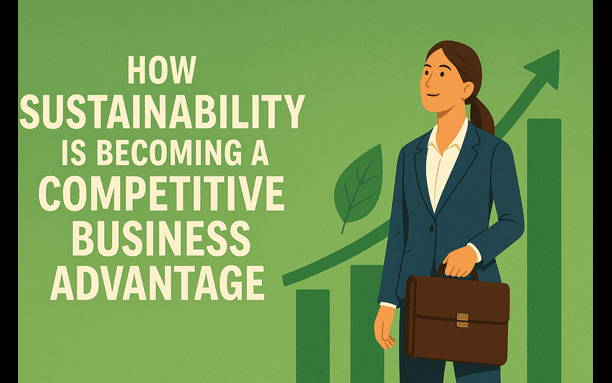In 2025, sustainability is no longer a “nice-to-have”—it’s a strategic business advantage. With growing consumer awareness, stricter regulations, and global climate concerns, businesses that embrace sustainability are not only helping the planet but also gaining a competitive edge.
Let’s explore how sustainability is transforming from a trend into a powerful business driver and why companies that lead in this space are winning market share, loyalty, and profitability.
1. Consumers Prefer Eco-Conscious Brands
Today’s consumers are more conscious than ever about where their money goes. Studies show that:
- Over 70% of U.S. consumers prefer to buy from sustainable brands
- Gen Z and Millennials are willing to pay more for eco-friendly products
- Transparency and sustainability are now tied to brand trust and loyalty
Businesses that actively promote green practices—from using recycled materials to reducing emissions—can attract and retain loyal, purpose-driven customers.
2. Operational Cost Savings Through Efficiency
Sustainability isn’t just about image—it’s also about smart resource management.
- Energy-efficient equipment cuts utility bills
- Reducing waste lowers disposal and production costs
- Streamlining packaging and logistics improves the bottom line
By optimizing operations through green initiatives, companies often see long-term savings that boost overall profitability.
3. Stronger Brand Reputation and Differentiation
In saturated markets, standing out is tough. Sustainability offers a clear differentiator.
- Brands that champion environmental and social causes stand out in the crowd
- Media and public relations efforts tied to sustainability earn positive coverage
- Certifications like B Corp, Fair Trade, and LEED reinforce credibility
This differentiation helps businesses build a stronger reputation, which leads to greater trust and a competitive edge in both B2C and B2B sectors.
4. Compliance and Risk Management
Regulations around environmental impact are tightening worldwide.
- Carbon reporting requirements are expanding
- Waste disposal and supply chain transparency are under greater scrutiny
- Non-compliance fines are growing
Businesses that proactively adopt sustainable practices are not only future-proofing themselves—they’re also reducing legal and financial risks.
5. Attracting Top Talent
Modern professionals, especially younger generations, want to work for companies that align with their values.
- 65% of job seekers say sustainability influences their choice of employer
- Eco-conscious companies report higher employee engagement and retention
- Purpose-driven workplaces tend to build stronger internal cultures
By promoting sustainability, companies create a workplace culture that attracts top talent—a critical edge in competitive hiring environments.
6. Driving Innovation and New Revenue Streams
Sustainability pushes companies to innovate. This often leads to new ideas, products, and markets.
- Eco-friendly product lines (e.g., biodegradable packaging, electric vehicles)
- Circular business models (e.g., product reuse, take-back programs)
- Green technology adoption (e.g., AI-powered energy management)
These innovations open the door to new revenue streams and help businesses evolve with changing consumer and environmental needs.
7. Sustainability as a Marketing Superpower
Sustainability-focused marketing is proving to be incredibly effective.
- Brands that tell authentic sustainability stories receive higher engagement rates
- Eco-labels and sustainability claims influence purchase decisions
- Social media content around green practices helps build community and virality
With the right messaging, sustainability can fuel brand awareness and boost conversion.
Real-World Example: Patagonia’s Sustainable Growth
Outdoor brand Patagonia has embedded sustainability into every part of its business—from using recycled materials to advocating for environmental policy. The result? A globally recognized brand with strong loyalty, consistent revenue growth, and a workforce that shares its values.
They’ve proven that sustainability doesn’t limit growth—it drives it.
Final Thoughts
Sustainability is no longer a side project—it’s a core strategy for future-ready businesses. Companies that embrace it now will benefit from lower costs, deeper customer trust, stronger branding, and long-term resilience.
As global expectations shift, businesses that prioritize sustainability aren’t just helping the planet—they’re outperforming the competition.

